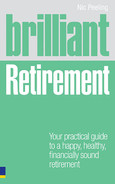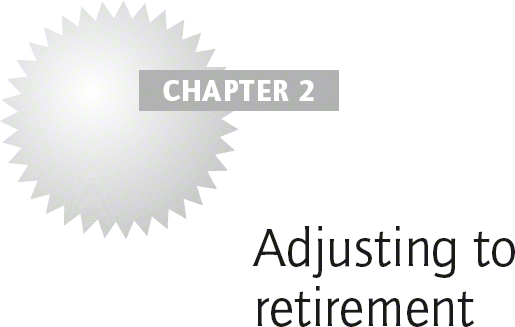An often-quoted ‘fact’ is that the three most traumatic events in a person’s life are a death in the family, divorce and moving house. I suspect this ‘fact’ was invented to highlight how stressful moving house can be. I think that the early stages of retirement can be as traumatic as any of these three events. By analysing the underlying factors that make retirement so much of an upheaval, you will understand what is happening to you and be better able to manage any problems you encounter.
I have been asked a number of times if the shock of retirement can harm your health. There have been numerous research studies into the effects of retirement on health and mortality, but unfortunately these studies report widely differing conclusions – from some saying health improves after retirement, to others saying that retirement causes significant health problems! I think it is reasonable to assume that minimising the shock of retirement can only benefit your health.
An interesting and optimistic piece of research by a leading academic in the UK found from an experimental sample that many of the people who reported serious problems adjusting to retirement were those who had not been happy at work. She theorised that many of these individuals had underlying personality issues that were the root cause of their problems. Stripping these people out of the sample, only 10 per cent of the remaining people had failed to eventually make a successful adjustment to retirement. However, many people are taken by surprise by how significantly they are affected by retirement. In the rest of this chapter I will analyse why retirement has such an impact on people, and will describe techniques that will allow you to better adjust to retirement.
What will I do with my time?
I define retirement as starting when you cease to work at the same intensity, duration, or stress levels as you had done earlier in your career. This will make time, possibly a lot of time, in your life, which needs to be filled. How are you going to fill it?
Retired people use their time in many different ways, and it is very helpful to understand the different calls on your time now you are retired.
Continue working
Many retired people want to continue, at least part time, with a regular paid, or voluntary, work commitment. The range of work commitments I encountered was vast. To illustrate the variety I will list a few:
- Part-time work for your previous employer.
- Consultancy work in your previous profession.
- Teaching/tutoring, either paid or voluntary.
- Good works – two particular examples came up time and again, which were charity and church work. Other examples include being a school governor or getting involved in local or national politics.
- Starting up a business.
- Taking on a full- or part-time job in a completely new area of business, often one that is much less high pressure than your previous profession.
Many people viewed continued working as a phase, which would decrease with time – although a few never wanted to stop.

Your attitudes to retirement will probably evolve as you get older. You need to interpret the advice in this book appropriately for your current position. For example, when reading the chapter on financial issues you may find that your appetite for risk declines as you get older.
Many benefits can flow from working in retirement:
- If you are being paid, this can help if finances are tight, or purchase treats if you are already financially comfortable.
- Work is a valuable part of someone’s persona. Losing your professional persona can be a big shock for people. Working in retirement can maintain your existing professional self-image or generate a new one.
- Work can give someone meaning to their life. For example, many people doing voluntary work wanted to put something back into society.
- Work is often a key source of social contacts that people miss when they retire.
- Work is often the single largest part of the structure in someone’s life. Losing all work structure can disturb a lot of people. Some people said that they liked to be forced to get up and go to work, and worried that the pace of life would slow too much if they gave up work altogether.
- Work used to fill a large part of your time and you may appreciate the time it can still occupy in your life.

If you are giving up work then you need to think about handling the loss of your professional persona, social network and the structure to your days. You need to find replacements for what you have lost, for example by consciously making time to maintain a social network.
Fulfilling an ambition
You now have the time to fulfil some of your ambitions. Examples that people told me about included:
- Learn to play the piano.
- Bicycle to Italy.
- Write a book.
- Research a family tree.
- Study a particular subject.
- Get a degree.
- Join the University of the Third Age (U3A).
- Restore a classic car.
- Learn to ride a motor bike.
- Visit a particular, far-off country.
- Learn to speak French.
- Learn to fly a plane.
Tackling projects
Less lofty than your ambitions, there are likely to be a number of projects you have always wanted to tackle. Examples might be:
- Sort out your toolshed.
- File/digitise your photographs.
- Write a piece of software.
- Learn to use a computer.
- Create the perfect lawn (that one’s mine).
- Create a vegetable patch.
- Tackle a DIY project (or 20!).
Counting wasps
A retired neighbour asked another neighbour, ‘Are you getting many wasps this year?’ The exasperated answer from the young working mother was, ‘I don’t have time to count wasps!’ There are so many things you now have time for. Some common examples I have heard include:
- See more of your grandchildren, friends and relatives.
- Sleep in if you want to.
- Read the newspaper properly.
- Read the pile of books you have bought over the years.
- Go off for days out or spontaneous weekends away.
- Spend more time on a hobby.
I leave you the pleasure of completing your own list.

Beware that counting wasps can fill your time so completely that you never get onto your projects and ambitions.
Freedom – I don’t have to …
I highlighted in the last section the freedom you have as a retired person to do what you want to do. A delightful flipside of this freedom, which will come as a shock to the system, is the number of things you no longer have to do, which used to dominate your life:
- Get up at a particular time.
- Dress in your work clothes.
- Commute to and from work.
- Face the relentless pressures of work deadlines.
- Deal with office politics.
- Shop and do all your chores over the weekend, while trying to unwind.
This sounds marvellous; it is marvellous. However, the structure of your old life has disappeared. Indeed, you are now a new person in your own eyes and in the eyes of your friends, relatives and the rest of society. You need new strategies to adjust to your new life.
Some adjustment strategies
Establish a new routine
Total freedom is too much like anarchy for most retired people. The key phase in the early stages of retirement is to establish a new routine. On the first day of your retirement it is very easy to think that you are now on holiday for the rest of your life. Most people I talked to had realised that a never-ending holiday would soon pall, however they also soon appreciated that you should not establish such a rigid routine that you didn’t enjoy your new freedoms. A constant warning I heard was the danger as you get older of becoming a slave to your routine.

Just because normally you do something at a fixed time is no reason not to do something else if you prefer.
A routine is something very practical and tangible that can help you adjust to retirement. The next point is just as important, but much less tangible.
Establish a new persona
For many working people their job is a very large part of who they think they are – ‘I am a doctor/teacher/solicitor, (etc.)’. Losing this identity can come as a big shock. This is especially true for men, and more so for high-achieving men. Women often have a leading role in the home, even if they have high-powered professional lives, and after retirement they have this home-based role to fall back on. Even someone who isn’t overtly status-conscious can be quite disturbed when they lose their work status. In addition, many people have significant power over others in their working lives, and losing that power can be very disturbing. As discussed previously, some retired people will develop a new persona by continuing to work in a paid or voluntary capacity. At the other extreme, you may present yourself as, ‘I am retired, and I don’t know how I found the time to go to work’. Most people will benefit from consciously thinking about how they wish to describe their new identity.
Wean yourself off adrenaline
Most workers are ‘adrenaline junkies’, where the constant stream of deadlines, crises and travel used to provide the buzz to keep going. For some people the withdrawal symptoms can be quite unpleasant. Improving your diet and taking more exercise definitely seems to help. Throwing yourself into a pet project can also be a good tactic. Starting your retirement with a long holiday has worked well for some people. The main point of this section is that by recognising the problem you are already a long way towards solving it.
Develop your social network
When you leave work you will lose a major source of social contact with friends and colleagues. I strongly advise you to invest time in building up a replacement network of friends. There are many ways of doing this:
- You can make the effort to talk to people – on the bus, at the gym, over the garden fence, etc.
- You can spend time meeting up with neighbours, friends, former colleagues, relatives, and the like.
- You can take up social activities such as walking, swimming, The University of The Third Age, hobbies, etc.
- You can throw parties.

If you have a partner it can be very easy to overly rely on them for social intercourse. If anything happens to your partner this can leave you very vulnerable to loneliness. You both need to have shared friends, but you also need your own individual friends.
Read the rest of the book
Future chapters will address other key adjustment techniques. These include how to manage your health and finances and how your relationships with partners, relatives and friends need to be managed.

